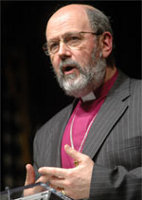









 If the blog looks quiet, there are certainly works in progress. While some blogs have new a ton of new posts day after day in an incessant, hurried effort, with virtually no mental checkpoint at all between “the first thing that comes to mind and sounds awesome and devastating in my internal monologue because I haven’t paused to examine it for weaknesses” and “the final version that appears on my amazing blog Debunking Christianity” (not looking at anyone in particular!), posting good material actually requires a decent amount of preparation time, which just doesn’t allow the constant barrage of posts. But rest assured, I haven’t forgotten you, and I’m working every day on new material, getting it finished and into shape to be posted only when it’s ready. I hope you appreciate the difference!
If the blog looks quiet, there are certainly works in progress. While some blogs have new a ton of new posts day after day in an incessant, hurried effort, with virtually no mental checkpoint at all between “the first thing that comes to mind and sounds awesome and devastating in my internal monologue because I haven’t paused to examine it for weaknesses” and “the final version that appears on my amazing blog Debunking Christianity” (not looking at anyone in particular!), posting good material actually requires a decent amount of preparation time, which just doesn’t allow the constant barrage of posts. But rest assured, I haven’t forgotten you, and I’m working every day on new material, getting it finished and into shape to be posted only when it’s ready. I hope you appreciate the difference!
So what am I working on? What is this stuff you’re waiting for?
Firstly, there are two podcast episodes in the works. One of them addresses the question, “what is faith”? It’s not about theology but epistemology. When we talk about faith and reason, what is the “faith” have of that couplet? What do Christian theists have when they have faith in God? Is it a kind of will to believe without the need for reasons or evidence? Or is it something else? The second podcast I’m working on is actually another instalment in the popular series In Search of the Soul, where I look at the mind-body problem. When I finished the series previously, I was aware of having omitted any coverage of the view of Aristotle (and of Thomas Aquinas, the Western medieval champion of Aristotelianism). So that’s what I’ll be looking at in that episode.
There are also a few blog entries in the making as well. I’ve already posted part one of a three part series on Richard Carrier’s arguments against the resurrection of Jesus. There I looked at Carrier’s extended comparison of the Rubicon crossing of Julius Caesar and the resurrection of Jesus. I’m working on parts two and three of that series. In part two I will be looking at his claims about the general insufficiency of the resurrection as a argument for Christianity, and also his rather extraordinary claim that Jesus’ survival of his resurrection and his escape from the sealed tomb and defeat of the Roman guards would be a more likely explanation for early Christian belief than his actual resurrection. Then in part three – in my view easily the most important of the three, I’ll be looking at Carrier’s most significant claim, to which he devotes by far the most time as it carries most of his case: His claim that the early Christians did not believe in the physical resurrection of the dead body of Jesus at all, but that they actually believed that while the former body remained dead in the tomb, Jesus left his body and entered a new, spiritual body – and that this is what they believed about the future resurrection of the dead as well.
I’m also chipping away at a post offering a historical perspective on the Classical Liberal political tradition and welfare, looking primarily at John Locke and his theory of property rights, which included his theory of the right of those in need to the support of others. I’ll also be contrasting that view with that of utilitarian John Stuart Mill.
There are a couple of other posts I’ve started, but I’m not sure that they’ll make the final cut, just due to my uncertainty over how much they really interest me: A post explaining the position known as sola scriptura, primarily for the sake of providing a fair explanation of that point of view for some of my Roman Catholic friends who seem to misunderstand that position considerably. The other post I’ve started is one discussing some comments by Thom Stark on whether or not some of the conquest accounts in the Old Testament might be hyperbolic, and whether or not we can tell this is the case (at least in part) by comparing contrasting accounts in those histories.
As is always the case, short term interests will pop up that suddenly occupy my attention and that I’ll write on (as in the last two posts on final punishment), but those are the pieces that I’m currently working on. Suggestions are always welcome!
Glenn Peoples


 A Godless Public Square: Do “private” religious beliefs have a place in public life?
A Godless Public Square: Do “private” religious beliefs have a place in public life? When I was a kid I always said I wanted to be an archaeologist. After a while I gave that idea up because it wasn’t realistic as a career option, so I thought. How ironic that I ended up studying music, theology and philosophy!
When I was a kid I always said I wanted to be an archaeologist. After a while I gave that idea up because it wasn’t realistic as a career option, so I thought. How ironic that I ended up studying music, theology and philosophy! As of yesterday, I have a
As of yesterday, I have a  If the blog looks quiet, there are certainly works in progress. While some blogs have new a ton of new posts day after day in an incessant, hurried effort, with virtually no mental checkpoint at all between “the first thing that comes to mind and sounds awesome and devastating in my internal monologue because I haven’t paused to examine it for weaknesses” and “the final version that appears on my amazing blog Debunking Christianity” (not looking at anyone in particular!), posting good material actually requires a decent amount of preparation time, which just doesn’t allow the constant barrage of posts. But rest assured, I haven’t forgotten you, and I’m working every day on new material, getting it finished and into shape to be posted only when it’s ready. I hope you appreciate the difference!
If the blog looks quiet, there are certainly works in progress. While some blogs have new a ton of new posts day after day in an incessant, hurried effort, with virtually no mental checkpoint at all between “the first thing that comes to mind and sounds awesome and devastating in my internal monologue because I haven’t paused to examine it for weaknesses” and “the final version that appears on my amazing blog Debunking Christianity” (not looking at anyone in particular!), posting good material actually requires a decent amount of preparation time, which just doesn’t allow the constant barrage of posts. But rest assured, I haven’t forgotten you, and I’m working every day on new material, getting it finished and into shape to be posted only when it’s ready. I hope you appreciate the difference!
 Dear friends
Dear friends
 If you’re not from New Zealand you may never have heard of a
If you’re not from New Zealand you may never have heard of a